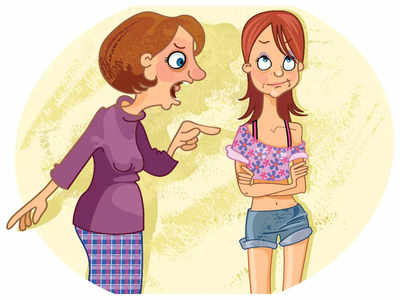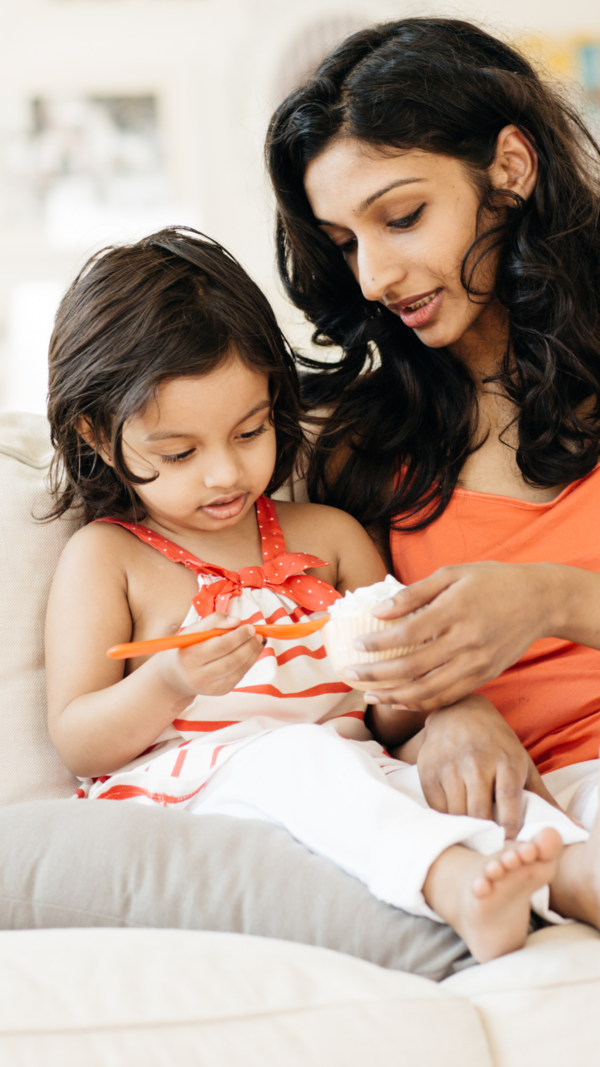Trending
This story is from April 7, 2022
Can scolding your kids drive them to take extreme steps?
The teen phase usually turns out to be a superstorm for children and parents alike. The child's biological changes alongside psychological and emotional changes muddle up their brain to clearly differentiate the right from wrong, making them prone to emotional volatility.

“Will my child commit suicide if I get too harsh with him”
A friend and a fellow mom called early in the morning. Sounding panicky she tells me that the Noida school boy who had gone missing two days ago, whose photos we were dedicatedly circulating, has been found dead. “The teen was apparently scolded by the mother after which he left the house and now his body has been found.This is so disturbing and traumatizing,” she added. She is a mother of two boys, one 10 and the other 15.
A quick search for the news item on Google revealed several news reports of children committing suicide after getting reprimanded by their parents. This may seem random but alarming enough for parents to feel anxious.

“Every child who is scolded will not end his life or indulge in dangerous behaviors,” explains child and adoloscent psychiatrist Dr Previn Dadachanji. “There will be some vulnerable children who may have low self esteem, anxiety or untreated depression who feel inadequate on getting scolded and think of ending their life.”
“This often happens with children who have not been told NO for things and parents indulge them. When these kids grow up and face rejections and upheavals, they find it difficult to cope with it,” adds Dr Dadachanji.
The teen phase usually turns out to be a superstorm for children and parents alike. The child's biological changes alongside psychological and emotional changes muddle up their brain to clearly differentiate the right from wrong, making them prone to emotional volatility.
Tough love
You will see irrational outbursts and completely unacceptable behavior, because your child is dealing with confusion, embarrassment, fear of failure, and a deep sense of vulnerability. We all have as parents indulged in saying harsh words in haste just to regret them later. But this does not make you a dysfunctional parent and it should not make you fear dangerous consequences, as long as you keep a few things in mind.
Dr Dadachanji shares a two-step strategy. Firstly, it’s pertinent for parents to recognise signs of any mental health issue that their child may be suffering from. Is he feeling anxious? Stays withdrawn? Looks sad? Do not take it lightly, explore it and see if it needs help.
Secondly, when you are scolding your child, be careful about how you do it. Demeaning your child will do no good. Talk in a collaborative manner instead of accusing and shaming him/her. Children are often impulsive in this age and when they say disturbing things as a retort, don’t take it lightly. Keenly observe for signs of disturbing behavior and act accordingly.
Unresolved parental trauma
But is scolding an offspring as simple as it sounds? Trauma coach Dr Gaurav Deka calls this a complex situation. “Often parents treat children in a scary way or physically or verbally abuse their children, or become strict with them, simply because they, without realizing, are reminded of their own unhealed childhood.”
Dr Deka further explains, “We have to understand that the child is naturally deeply in love with the parents. No child ever grows up without traumatic experiences to end up hating their parents. Child takes on all the destructive behavior patterns from their parents, healed or unhealed in the form of love. Children are a loyal representation to the family, they take it all in. We often don’t get to know what weight the child is carrying on behalf of the parent. His consciousness is not an independent consciousness.”
Acknowledge unhealed trauma
Parenting as a practice can never be perfect. We don’t need to be perfect. We need to be able to have the courage to acknowledge what’s unhealed within us. “Have the acknowledgement that you carry some harsh unhealed experience and that is the lens with which you operate in your life. Admit that at some point you will have to look at these unhealed experiences and heal them.”
So accept there are problems and commit to tackling them or just say it publicly that you are unable to!
A friend and a fellow mom called early in the morning. Sounding panicky she tells me that the Noida school boy who had gone missing two days ago, whose photos we were dedicatedly circulating, has been found dead. “The teen was apparently scolded by the mother after which he left the house and now his body has been found.This is so disturbing and traumatizing,” she added. She is a mother of two boys, one 10 and the other 15.
A quick search for the news item on Google revealed several news reports of children committing suicide after getting reprimanded by their parents. This may seem random but alarming enough for parents to feel anxious.

“After reading this news I am so scared of scolding my son! What if he does something!” writes a mom in one mother’s Whatsapp group. While others may not word them in this manner, news of teens committing suicide has often been a disturbing zone for parents. They start to question their discplining abilities and get caught up in ‘the right and the wrong’. But before we address these thoughts, it is important for all of us to understand that there is no perfect child or a perfect parent.
“Every child who is scolded will not end his life or indulge in dangerous behaviors,” explains child and adoloscent psychiatrist Dr Previn Dadachanji. “There will be some vulnerable children who may have low self esteem, anxiety or untreated depression who feel inadequate on getting scolded and think of ending their life.”
“This often happens with children who have not been told NO for things and parents indulge them. When these kids grow up and face rejections and upheavals, they find it difficult to cope with it,” adds Dr Dadachanji.
The teen phase usually turns out to be a superstorm for children and parents alike. The child's biological changes alongside psychological and emotional changes muddle up their brain to clearly differentiate the right from wrong, making them prone to emotional volatility.
Tough love
You will see irrational outbursts and completely unacceptable behavior, because your child is dealing with confusion, embarrassment, fear of failure, and a deep sense of vulnerability. We all have as parents indulged in saying harsh words in haste just to regret them later. But this does not make you a dysfunctional parent and it should not make you fear dangerous consequences, as long as you keep a few things in mind.
Dr Dadachanji shares a two-step strategy. Firstly, it’s pertinent for parents to recognise signs of any mental health issue that their child may be suffering from. Is he feeling anxious? Stays withdrawn? Looks sad? Do not take it lightly, explore it and see if it needs help.
Secondly, when you are scolding your child, be careful about how you do it. Demeaning your child will do no good. Talk in a collaborative manner instead of accusing and shaming him/her. Children are often impulsive in this age and when they say disturbing things as a retort, don’t take it lightly. Keenly observe for signs of disturbing behavior and act accordingly.
Unresolved parental trauma
But is scolding an offspring as simple as it sounds? Trauma coach Dr Gaurav Deka calls this a complex situation. “Often parents treat children in a scary way or physically or verbally abuse their children, or become strict with them, simply because they, without realizing, are reminded of their own unhealed childhood.”
Dr Deka further explains, “We have to understand that the child is naturally deeply in love with the parents. No child ever grows up without traumatic experiences to end up hating their parents. Child takes on all the destructive behavior patterns from their parents, healed or unhealed in the form of love. Children are a loyal representation to the family, they take it all in. We often don’t get to know what weight the child is carrying on behalf of the parent. His consciousness is not an independent consciousness.”
Acknowledge unhealed trauma
Parenting as a practice can never be perfect. We don’t need to be perfect. We need to be able to have the courage to acknowledge what’s unhealed within us. “Have the acknowledgement that you carry some harsh unhealed experience and that is the lens with which you operate in your life. Admit that at some point you will have to look at these unhealed experiences and heal them.”
So accept there are problems and commit to tackling them or just say it publicly that you are unable to!
End of Article
FOLLOW US ON SOCIAL MEDIA









